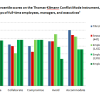Dealing with Conflict

Looking for a church that’s a haven of peace, harmony, and fellowship, in a world riddled with conflict, divisive politics, and loss of community? Join the crowd. Most of us want congregations to be places of compassion and cooperation, but churches are also full of opportunities for conflict. And that’s not a bad thing—at least, not necessarily.
Conflicts emerge between staff members, lay leaders, and groups. Competition develops over available space and money. “Worship wars” has become a familiar phrase describing a familiar reality. In all of these situations, people have different aims and goals, though usually the best of intentions. Questions of authority and power, history, and theology add extra layers of complication.
But, when handled well, conflicts can lead to growth, transformation, and a deepening of relationships. This section will look at how clergy typically approach conflict and ways they can learn to manage conflict more effectively.





